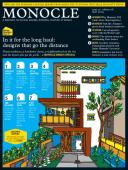
Issue 73
In for the long haul: designs that go the distance. Sharp residences, a handsome classic, a neighbourhood on the rise and the buyers who get the goods — a Monocle design special
In This Issue
Oops! No content was found.
Looks like we no longer have content for the page you're on. Perhaps try a search?
Return Home

